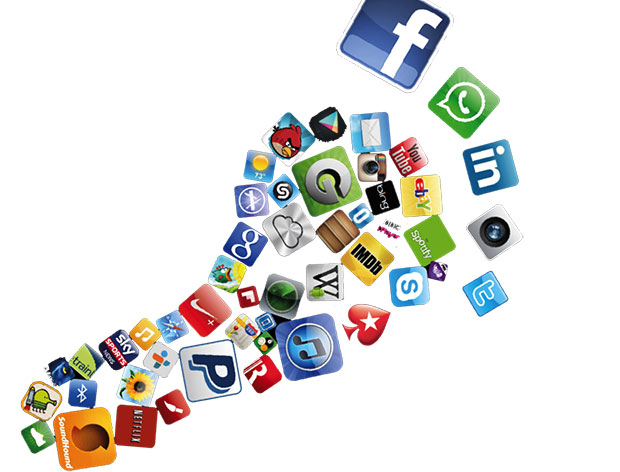 Climate change and sustainability are increasingly becoming part of our everyday conversation. And, thanks to the success of Blue Planet II and climate change advocates such as Greta Thunberg, it is hard to recall a time when such topics were not so mainstream.
Climate change and sustainability are increasingly becoming part of our everyday conversation. And, thanks to the success of Blue Planet II and climate change advocates such as Greta Thunberg, it is hard to recall a time when such topics were not so mainstream.
We often discuss our need to consider reducing air travel, eating a more plant based diet, decarbonising our energy supply and banning single use plastics. However, what doesn’t get discussed much, is our use of technology and the impacts that they have on the world around us.
Dr Rabih Bashroush from the University of East London, has already suggested why technology use should play an equally important part in our conversations:
Cristiano Ronaldo has the largest Instagram account in the world with 190 million followers. The energy needed for his followers to visualise every single photo he posts is estimated at 24 MWh, which is around 5 to 6 years’ electricity consumption of a UK household.
Despacito, a song by the Puerto Rican philosopher Luis Fonsi, has been viewed more than 6 billion times on YouTube. Depending on the assumptions used, the energy consumed by watching this video to date could be anything between 60 GWh to 900 GWh, roughly equivalent to the annual consumption of between 14,000 and 210,000 UK households. Or even the combined annual electricity consumption of Chad, Guinea-Bissau, Somalia, Sierre Leone and the Central African Republic!

More social responsibility?
As our lives, work and social interactions become increasingly digitised, the concept of a digital citizen is now well known, and becoming increasingly mainstream. I would therefore like to put forward a variation on this: The Responsible Digital Citizen.
Most of us have some sort of online footprint – from our use of social media, photograph storage or productivity tools (like Microsoft Office) stored in the cloud. The energy that is used to enable these online activities and capabilities is enormous - the equivalent to some of the most industrialised nations on the planet.
The data centres and companies that provide these services are ‘greening’ (for example, through the use of green energy) but data growth is exponential, and so too are the energy levels that are needed to store and access it.
Risks versus benefits
Clearly we should recognise the amazing carbon reducing, environmentally beneficial and socially enhancing benefits that information and communication technology (ICT) bring. Benefits that are achieved through increased connectivity and continually improving and more efficient technology. In fact, nothing quite describes these benefits and opportunities as well as the UN Sustainable Development Goals (SDG’s). And without ICT/digital, many of these goals would not be achievable.
But there are also of course many risks, especially in the supply chains, and with ICT waste. Thankfully, organisations such as the Defra group, are working hard to address them (often highlighted on our Defra e-Sustainability Alliance blog site).
Individual New Year changes
So what can we do as individuals to help make a difference? How can we become more socially responsible and at the same time help to protect the world around us? This is what I have been thinking about and questioning myself on as part of my New Year’s resolutions. In the end I decided that the 3 digital changes that I will strive to achieve are:
- Digital Detox
I spend far too much time on social media. It is not healthy for me, nor as suggested above, the planet. Therefore I will remove some of the social media apps from my phone and I will stop the notifications from them. Yes I can still login and see what my friends are up to, but it will now take me a few steps rather than a single click. I’m hoping that this will help break my habits and reduce my usage. - Unlinking automatic uploads to the cloud
This is a setting on all of our phones, tablet and laptops. By unlinking the auto uploads I am hoping to rationalise my photographs. I have 1000s of them, and many of them have never been viewed. Instead, I will spend the time that I have saved by not endlessly scrolling on social media, to delete some photographs and only keep the good ones. Every month or so, I will connect my phone to the laptop at home and download the best photos to my hard drive to keep, and print my favourites. - Buy CDs!
I listen to a lot of music. I have 100s of CDs, but until recently I didn’t really appreciate the impact of streaming services on the planet. So, for my favourite music, which I listen to regularly, I will return to buying a physical copy. Not only will this support the musical artist better (as they will get paid from the sale), but it will also have a lower impact on the planet. Win win.
Your New Year’s resolutions?
As users of ICT both inside and outside of work, almost all of us can make a difference through the social and technological choices that we make.
Wouldn’t it be great then, if like me, this New Year, we all look a little harder at our current technology habits, and reflect on them – perhaps a little harder than we would do normally.
So that ultimately, even with just 3 relatively small changes or tweaks to our social habits, we can ensure our love of new technology doesn’t lead to its own collapse. Nor of the planet around us.
I’m trying to be more digitally responsible this New Year through my technological commitments – are you, and if so, what will yours be?
Read more blogs on ICT sustainability
5 comments
Comment by Luella posted on
Hi, I was hoping to find some sources sited or further information for how to calculate watt-hours of instagram use and streaming.
Comment by Adam Turner posted on
Hi Luella. Many thanks for reading and commenting. The calculations where completed by Dr Rabih Bashroush, he is cited within the blog. https://www.uel.ac.uk/Staff/b/rabih-bashroush. This is a new and growing area and my personal intention was to raise awareness of the possible impacts of our digital lives and how we all have a role to play in managing any impacts. Other great sources of info can be found from Greenpeace's Clicking Clean reports. I have also found another recent blog covering a similar topics https://medium.com/wedonthavetime/guest-blog-post-the-alarming-environmental-impact-of-the-internet-and-how-you-can-help-6ff892b8730d. I hope this helps.
Comment by Antonia P. posted on
Great article! I have before considered that data centres have a big environmental impact but always in a business use sense and never thought of how my auto-syncing settings or social media use impact that. Food for thought 🙂
Comment by Adam Turner posted on
Hi Antonia. Thanks for your comment, I'm glad you enjoyed the blog. I often ponder how much impact we could all have collectively from such simple changes to our behaviours. I am sure they would be hugely beneficial. All the best. Adam
Comment by Chris posted on
Thanks Ada, great post, it is interesting how "digital" is so often thought of as automatically better for the environment.